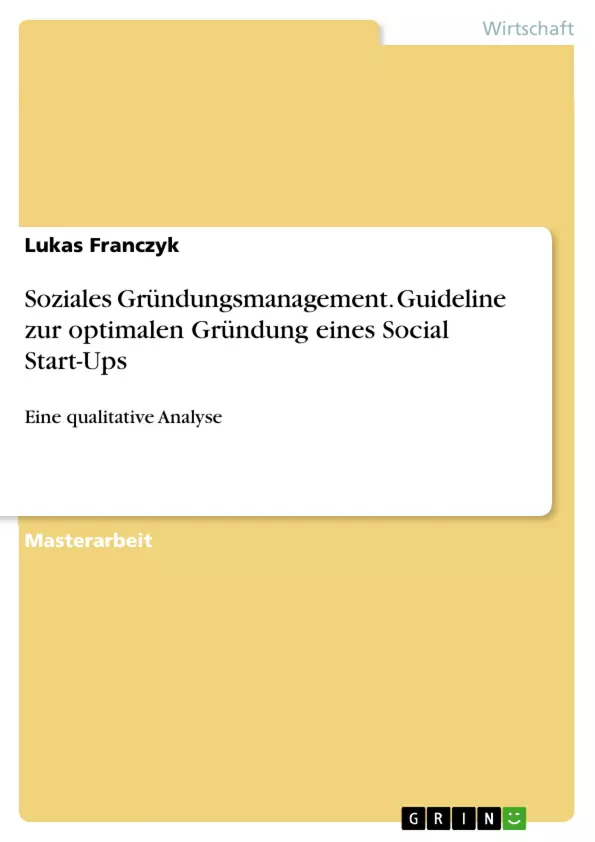Die Forschung im Bereich Social Entrepreneurship wird zunehmend intensiver, jedoch steckt sie noch immer in den Kinderschuhen. Insbesondere fehlt es an relevanten Erkenntnissen für die Praxis, obwohl die Nachfrage nach sozialen Bedürfnissen stetig zunimmt. Ziel der Arbeit ist es, zukünftige Social Entrepreneurs mit den Ergebnissen zu unterstützen und ihnen einen Weg zur bestmöglichen Umsetzung eines Social Start-ups in Deutschland aufzuzeigen. Grundlage dafür ist eine qualitative Untersuchung, bestehend aus Tiefeninterviews mit elf Social Entrepreneurs und Sozialunternehmern in Deutschland.
Die Arbeit identifiziert zwölf Chancen sowie elf Risiken des Social Entrepreneurship und unterteilt diese nach persönlicher, unternehmerischer und gesellschaftlicher Ebene. Dabei sind gemeinnützige Social Start-ups stärker von den Risiken betroffen als Gewinnorientierte. Des Weiteren präsentiert die Arbeit eine Guideline zur optimalen Gründung eines Social Start-ups. Diese zeigt, dass es einige entscheidende Unterschiede zur Gründung eines Commercial Start-ups gibt. Zudem enthält sie Lösungsansätze zur Vermeidung eines Mission Drifts. Ferner empfiehlt die Arbeit Social Entrepreneurs den Aufbau einer starken Abhängigkeit zwischen sozialen und ökonomischen Zielen sowie die Reduktion der Abhängigkeit von Spendengeldern.
Inhaltsverzeichnis
- Die Relevanz des Social Entrepreneurship
- Begriffsbestimmung und theoretische Fundierung
- Entstehung und Definition von Entrepreneurship
- Herleitung und Konzeptualisierung von Social Entrepreneurship
- Klassifizierung von Social Entrepreneurship
- Unterschiedliche theoretische Ansätze zur Mobilisierung knapper Ressourcen von Social Entrepreneurs
- Resource Based View
- Resource Dependence Theory
- Die Rolle von Bricolage und Effectuation
- Bestandsaufnahme der Literatur
- Überblick der Literatur zu Social Entrepreneurship
- Der Anspruch die Welt zu verbessern
- Gefahren eines Social Entrepreneurs
- Die Versuchung eines Mission Drifts
- Die Schwierigkeit der Messbarkeit von sozialem Wert
- Das Zufriedenstellen von heterogenen Stakeholdern
- Entstehung eines Social Start-ups
- Methode und Analyse
- Ergebnisse und Propositionen
- Chancen des Social Entrepreneurship
- Aus Sicht des Social Entrepreneurs
- Aus Sicht des Social Start-ups
- Aus Sicht der Gesellschaft
- Risiken des Social Entrepreneurship
- Auf persönlicher Ebene
- Auf unternehmerischer Ebene
- Auf gesellschaftlicher Ebene
- Guideline zur Gründung eines Social Start-ups
- Chancen des Social Entrepreneurship
- Diskussion
- Zusammenfassung
- Theoretischer Beitrag
- Implikationen für Social Entrepreneurs
- Limitationen und Forschungsausblick
Zielsetzung und Themenschwerpunkte
Diese Masterarbeit untersucht die Herausforderungen und Chancen des Social Entrepreneurship in Deutschland. Ziel ist es, einen tieferen Einblick in die Praxis des Social Entrepreneurship zu gewinnen und relevante Erkenntnisse für die Gründung und Entwicklung sozialer Unternehmen zu liefern.
- Die Herausforderungen und Chancen des Social Entrepreneurship in Deutschland
- Die Bedeutung von Ressourcenmobilisierung und -management für Social Entrepreneurs
- Die Risiken und Chancen von Mission Drift bei Social Start-ups
- Die Entwicklung einer Guideline zur Gründung eines Social Start-ups
- Die Rolle von Stakeholdern im Social Entrepreneurship
Zusammenfassung der Kapitel
Kapitel 1 legt die Relevanz des Social Entrepreneurship dar und unterstreicht die Notwendigkeit für weitere Forschung in diesem Bereich. Kapitel 2 führt in die Begriffsbestimmung und die theoretische Fundierung des Social Entrepreneurship ein. Es werden verschiedene Ansätze zur Mobilisierung knapper Ressourcen von Social Entrepreneurs diskutiert. Kapitel 3 präsentiert einen Überblick über die bestehende Literatur zum Thema Social Entrepreneurship, wobei die Herausforderungen und Chancen für Social Entrepreneurs beleuchtet werden. Kapitel 4 beschreibt die Methode und die Analyse der vorliegenden Arbeit, die auf einer qualitativen Untersuchung mit elf Social Entrepreneurs in Deutschland basiert. Kapitel 5 präsentiert die Ergebnisse der Untersuchung und identifiziert Chancen und Risiken des Social Entrepreneurship. Es beinhaltet eine Guideline zur Gründung eines Social Start-ups. Kapitel 6 diskutiert die Ergebnisse der Arbeit und ihre Implikationen für Social Entrepreneurs. Es werden Limitationen der Studie und mögliche Forschungsansätze für die Zukunft aufgezeigt.
Schlüsselwörter
Social Entrepreneurship, Social Start-ups, Ressourcenmobilisierung, Mission Drift, Stakeholdermanagement, qualitative Forschung, Guideline, Deutschland.
Häufig gestellte Fragen
Was ist Social Entrepreneurship?
Social Entrepreneurship bezeichnet unternehmerisches Handeln, das primär auf die Lösung gesellschaftlicher oder ökologischer Probleme ausgerichtet ist statt auf reine Gewinnmaximierung.
Was versteht man unter "Mission Drift"?
Mission Drift ist die Gefahr, dass ein soziales Unternehmen seine ursprünglichen sozialen Ziele aus den Augen verliert, um wirtschaftlich rentabler zu werden.
Welche Risiken haben Social Start-ups in Deutschland?
Zu den Risiken zählen finanzielle Abhängigkeit von Spendengelder, die Schwierigkeit der Messbarkeit des sozialen Werts und die Balance zwischen ökonomischen und sozialen Zielen.
Was unterscheidet ein Social Start-up von einem kommerziellen Start-up?
Der Hauptunterschied liegt in der Zielsetzung: Während kommerzielle Start-ups den Shareholder-Value maximieren, steht beim Social Entrepreneurship der gesellschaftliche Mehrwert im Fokus.
Was ist "Bricolage" im Kontext von Gründungen?
Bricolage beschreibt die Fähigkeit von Gründern, mit den gerade zur Verfügung stehenden, oft knappen Ressourcen neue Lösungen zu schaffen.
Wie kann man die Abhängigkeit von Spenden reduzieren?
Durch den Aufbau hybrider Geschäftsmodelle, bei denen soziale Dienstleistungen oder Produkte am Markt verkauft werden, um die soziale Mission selbst zu finanzieren.
- Quote paper
- Lukas Franczyk (Author), 2016, Soziales Gründungsmanagement. Guideline zur optimalen Gründung eines Social Start-Ups, Munich, GRIN Verlag, https://www.grin.com/document/367092



